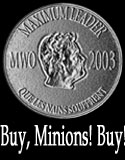On a lighter note, my recent sojourn in the sunny state of Florida left me in a state of enforced idleness for a week and a half.
And Santa brought me goodies.
One of the best was Rod Dreher’s Crunchy Cons. Although my principles aren’t first and foremost a result of my belief system, I found that Dreher’s views quite attractive. Dreher believes that conservatives have allowed many of their core beliefs to be overshadowed by the cult of capitalism. Your humble Smallholder likes to paraphrase the great Winston Churchill when he explains his humble economic beliefs: “Capitalism is the worst form of economics… except for all the others.”
Capitalism works, my friends. I would ask our socialist readers (do we have any?) one simple question: “How’s that workin’ out?”
Capitalism has some serious rough edges.
Dreher, more eloquently than I, says that we need to remember that capitalism is a means to an end - a good society - and not an end in itself. When capitalism threatens that good society (Dreher is particularly concerned about its impact on society’s bedrock institution - the family), we have to be willing to modify or redirect the market. Dreher doesn’t talk specifics, but my newfound appreciation of the way much of government’s intervention is counterproductive makes me leart of unintended consequences. I am fine - in principle - with limiting the market. But the devil, as they say, is in the details. Much of what passes for “pro-environment/pro-farmer” agricultural regulation (market meddling) is neither pro-environment or pro-farmer. Most of our subsidy system is designed to protect the monopolies of the likes of Archer-Daniels Midlands. Government meddling with the market with the social welfare system hasn’t worked out so well either.
Dreher is by no means a liberal, but I fear that his fine principles are also in danger of forgetting the law of unintended consequences. If the camel’s nose gets under the tent, how do we prevent lobbyists and lawyers from tweaking legislation so that it helps the existing economic hegemons?
I’m with Dreher when we talk about some of the pernicious impacts of capitalism. Unfortunately, he doesn’t convince me that direct intervention will move us closer to the ideal of a good society.
That said, when he points out how existing governmental meddling, I’ve got his back. I’m all for cutting those pro-ADM “agricultural” subsidies so that the market will be more favorable to organic small farmers. If you want to know why some of us grow our own meat, read Dreher’s portrayals of small farmer stewardship.
I read two other books - Heinlein’s Time Enough For Love and a terraforming book. Heilein’s libertarian screed is much better than Rand’s. I never was able to work my way through Atlas Shrugged, but Heinlein’s political jeremiad kept me reading. Terraforming Harelquin’s Moon left me going “eh.” There were some interesting parts, but overall I wouldn’t call it Niven’s best work.
In a more serious vein, I recommend “Misquoting Jesus.” Give it to your best fundamentalist friend. Ehrman’s survey of the textual detective work and problems of scriprutal transmission is well-reasoned, supported by evidence, and decisively damning of the “If the King James was good enough for Jesus, it’s good enough for me,” “Every jot and tittle” crowd. I now have a more sympathetic view of St. Paul - evidently some of the misogynist stuff in the Epistles are later additions and not original. I think the Big Ho would particularly enjoy this book (thanks for the farming link, by the way).
I have started “The Wisdom of Crowds” and am impressed so far. If my recent spate of posting holds up, I’ll give you my thoughts (for a price comensurate with their value).
The very best gift I received was the Univeristy of Wisconsin’s Beginning Dairy Farmers class. The multi-DVD set has 26 videotaped lectures, along with handouts and powerpoints. While the production value was rather low, the information was solid and I learned a great deal. Heck, I’m even working on putting together a business plan.



